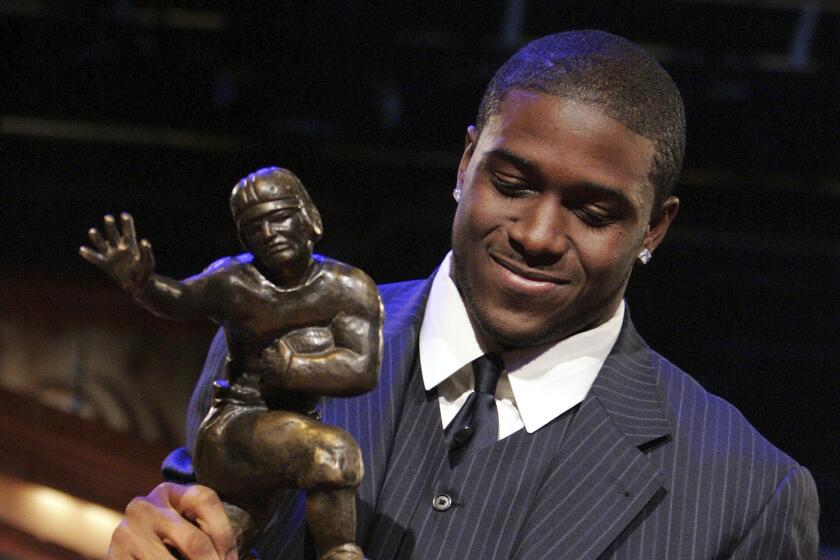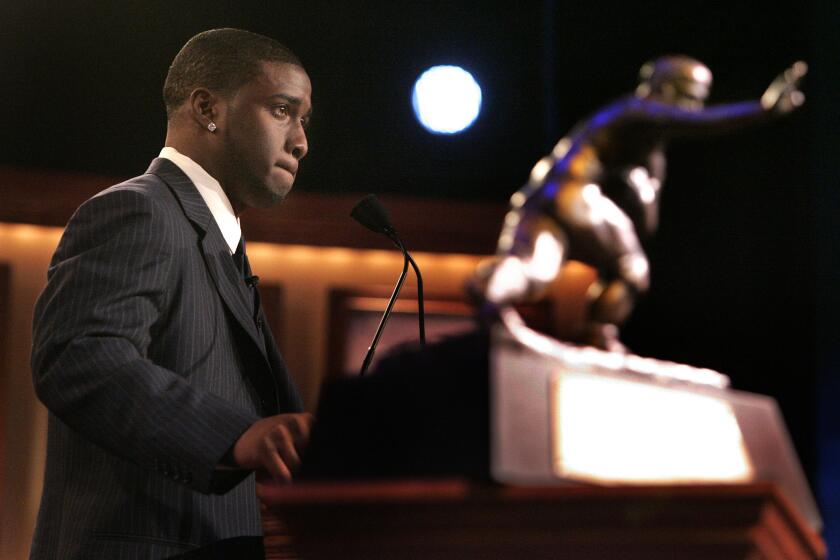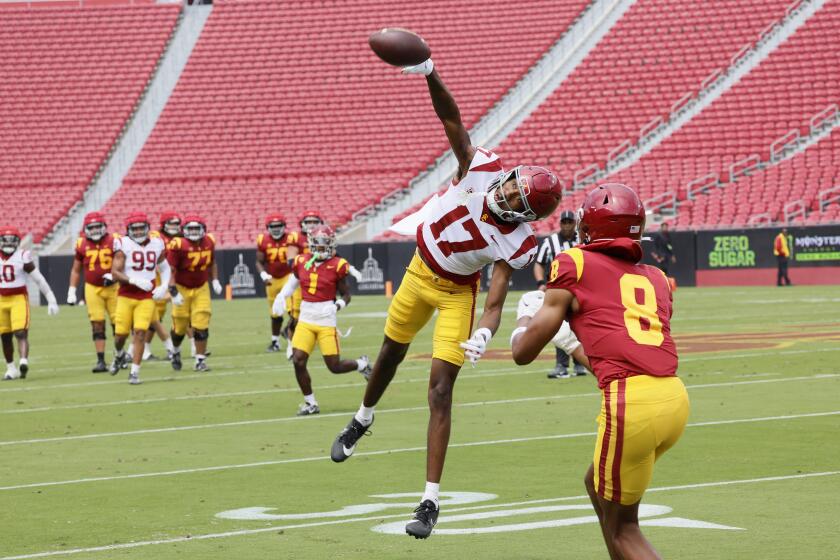Donna Heinel’s indictment complicates Mick Haley’s USC arbitration complaint
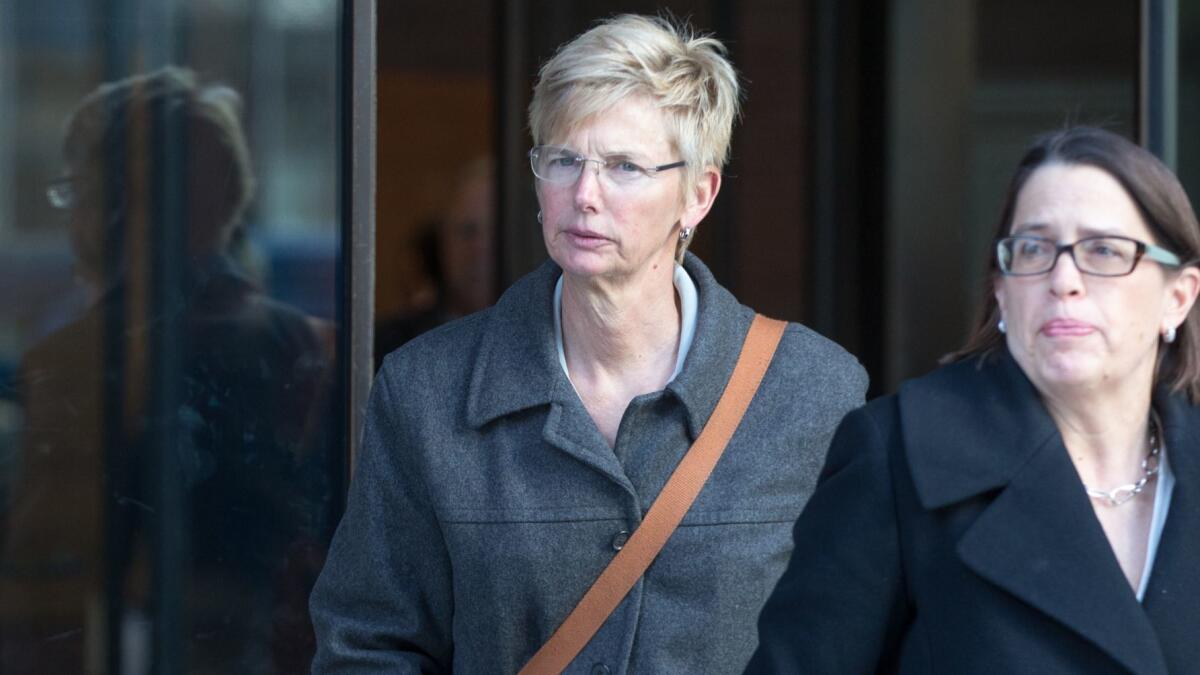
Months before Donna Heinel was federally indicted for her alleged involvement in the college admissions bribery scheme, the now-former USC senior women’s athletic administrator faced another legal matter that called her behavior and ethics into question.
In July, former USC women’s volleyball coach Mick Haley accused USC and Heinel of harassment because of age discrimination in a complaint filed with the American Arbitration Assn. Haley’s attorney, Christopher Ludmer, alleged that Heinel attempted to limit the team’s roster, subjected Haley to “contrived” criticism and demanded that he retire before his five-year contract expired, calling the 75-year-old coach “archaic” and “old.”
A hearing was set for August 2019, but, in the weeks after Heinel’s arrest on March 12, a potential problem emerged for her defense in the criminal case against her: What if, through answering questions in a deposition in the Haley matter, Heinel gave federal prosecutors ammunition that could aid them in convicting her for participating in a racketeering conspiracy?
On March 25, Heinel pleaded not guilty to the federal charge. She faces up to 20 years in prison if convicted for conspiring to accept bribe payments to facilitate the admission of nonworthy athletes into USC. On April 12, she filed a motion to stay the Haley hearing and for a protective order against any discovery on her until her criminal matter is resolved. On April 25, Haley filed an opposition to both requests, and on Friday, USC urged a brief stay so that discovery could proceed in an efficient manner.
On Monday, the arbitrator ruled against Heinel and in favor of Haley on both requests, according to an email reviewed by the Los Angeles Times. Because of the delay in discovery related to Heinel’s indictment, the arbitrator ordered to continue the hearing from August 2019 to March 2020, a decision that served as a blemish on Haley’s victory and a desired result for USC.
The most important development, though, is that Heinel will now be deposed regardless of the status of her criminal case.
“Mr. Haley objects to allowing Dr. Heinel to use a parallel criminal proceeding to bring this civil matter to a halt as well as using the indictment as a shield indefinitely to frustrate the course of discovery to her sole advantage,” the arbitrator wrote. “I am not persuaded at this juncture that Dr. Heinel cannot participate fully in this arbitration with regard to facts which do not implicate her criminal case.”
According to the email, Heinel asserted that “the stay and protective orders were necessary because she is in an untenable position of choosing to defend herself in this arbitration thereby harming her criminal case or invoking her Fifth Amendment rights and not being able to defend herself against Claimant’s allegations.”
Heinel’s attorney, Nina Marino of Kaplan Marino in Beverly Hills, responded in a statement to The Times.
Sign up for our daily sports newsletter »
“Civil matters are commonly stayed pending the resolution of criminal matters in order to protect the integrity of the legal proceedings,” Marino said. “Our client has a right to fair process in both the criminal and civil arenas. We are of course disappointed the stay was not granted, but the arbitrator’s decision to continue the civil hearing at least protects our client’s right to defend herself — for now.”
Attorneys from each side will now be tasked with establishing parameters aimed at allowing Heinel, who was fired by USC on the day of her arrest, to participate in discovery without implicating her criminal case.
Most of Haley’s case against Heinel and USC is not expected to overlap the criminal allegations. But there will be some overlap, particularly involving Haley’s allegation that Heinel limited him in the composition of his roster.
The 200-page federal complaint details, through court-approved wiretaps of government witness Rick Singer, the myriad ways in which Heinel allegedly pushed fake athletes through USC’s athletic admissions subcommittee in return for payments from the prospective students’ parents totaling more than $1.3 million.
The affidavit alleges that two Bay Area parents, Todd and Diane Blake of Ross, Calif., bribed Heinel to get their daughter admitted into USC as a purported women’s volleyball recruit in the fall of 2017, which ended up being Haley’s last season as the Trojans’ coach.
The parents allegedly provided Heinel a falsified resume that included their daughter receiving a number of honors and playing on a club team that qualified for junior nationals three years in a row. The Blakes allegedly wrote a check to “USC Women’s Athletics” in care of Heinel for $50,000 and later sent $200,000 to Singer’s made-up charity. The Blakes’ daughter enrolled at USC but was not listed on the women’s volleyball roster in the fall of 2018.
Ludmer, Haley’s San Diego-based attorney, told the Times that Haley did not know about the Blakes’ daughter’s admission and had never seen their names until they appeared in the federal indictment.
Interviews by The Times with former USC athletic department staff members in March revealed that Heinel had the power to prioritize one athlete over another in her dealings with the subcommittee. Coaches could ask Heinel for help getting a preferred walk-on into the school, but, ultimately it was up to her.
The allegations against Heinel contained in the affidavit could bolster Haley’s claim that Heinel negatively affected his roster and, therefore, his team’s competitiveness. The Trojans won the 2002 and 2003 national championship under Haley. During his last season in 2017, USC went 25-10, finished second in the Pac-12 and advanced to an NCAA regional final.
In December of 2017, USC athletic director Lynn Swann announced Haley would not return for another season. Swann replaced Haley with Brent Crouch, 43, a month later.
In his first college head coaching job, Crouch went 55-66 in four seasons at the University of Portland, which had gone 0-27 the year before he took over. In Crouch’s first season at USC, the Trojans went 22-11 and lost to San Diego in the second round of the NCAA tournament.
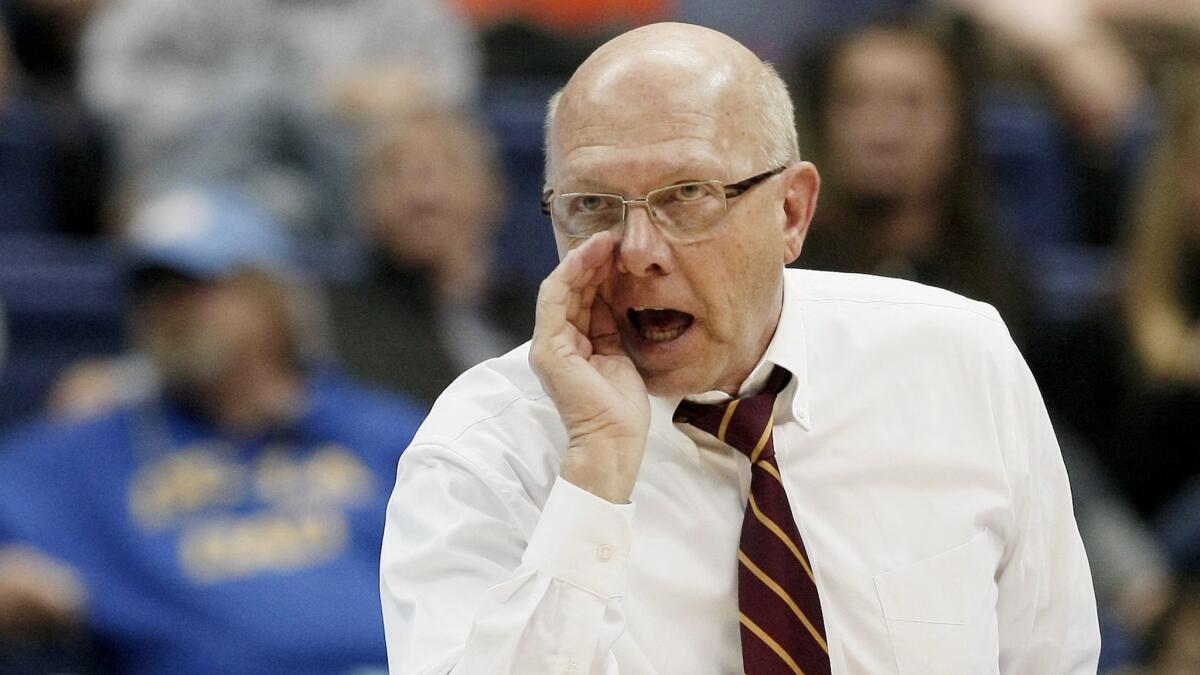
Swann has already been deposed in discovery for the Haley case.
One of the allegations Haley made against USC in the complaint is negligent hiring, supervision and retention. Ludmer is expected to highlight that USC hired an athletic director in Swann with no prior experience running a large athletic department. Ludmer will also try to establish that Swann gave Heinel minimal oversight, an assertion that has been buttressed by the allegations in the criminal case and Swann’s response to it.
Swann told The Times in March that he was “blindsided” by the news of Heinel’s alleged involvement in the scheme.
“The reason why no one would know that this was happening is because we had one person in charge of submitting the academic records to our admissions department,” Swann said of Heinel. “And that one person was in charge of getting that information back and distributing it to the coaches and letting other people know.”
Haley is seeking $2 million in addition to punitive damages and attorneys’ fees.
Twitter: @BradyMcCollough
More to Read
Go beyond the scoreboard
Get the latest on L.A.'s teams in the daily Sports Report newsletter.
You may occasionally receive promotional content from the Los Angeles Times.




